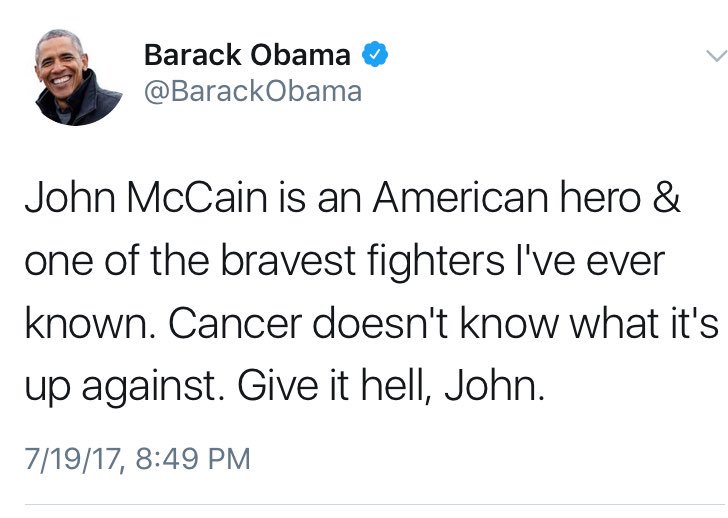John McCain: Cancer as Combatant

By Dr Binoy Kampmark
Mortality can either make you bookish, or drive you into the arms of the spiritual. But in a more distinct sense, it can render you prone to attribute to nature mysterious powers of a human quality. To do so is seen as the first step on the road to defeating it, even if nothing of the sort will happen.
The point is easy enough to fathom: a disease described as an enemy within, wasting the body, taking life out of it as the accessory of the Grim Reaper, much like an occupying army that rapaciously drains a territory. The military metaphor, for that reason, enlists humanity in a mission to combat, a call to arms.
And so, when we see the responses to the brain cancer diagnosis of veteran Arizona Senator John McCain, we see the forces of mankind arraigning themselves against the forces of cancer, whose cells, like the soldiers of a medieval khanate, threaten life and limb.
In the aftermath of the announcement, McCain was featured in footage and accounts suggesting that he had booked a one-way ticket to the morgue, but would make a good fist of it. The leitmotif here was that of the fighter, the battler, the warrior. But instead of battling the North Vietnamese (yes, as a wounded pilot, imagery of a broken body was screened), he was facing an adversary more formidable, more insidious.
Well wishing notes were sent, and in a digital age, these do not come in posted cards but social media outpourings. “Cancer,” tweeted President Barack Obama, “doesn’t know what it’s up against. Give it hell, John.” The point being made after describing McCain as “an American hero & one of the bravest fighters I’ve ever known.”
The first figure of prominence to rhetorically see cancer as a target (much like North Vietnam) was President Richard Nixon. His address on signing the National Cancer Act of 1971 was instructively belligerent. In declaring the act as possibly “the most significant action taken during this Administration” he considered the predations of the disease as so significant, it had claimed more lives each year “than all the Americans who lost their lives in World War II.”
Cancer had to be subjugated, battered, defeated, conquered. Anger, to use a remark by Virgil, supplies the arms. A massive mobilisation, both voluntary and otherwise, had to be undertaken in something akin to a millenarian mission, whose ultimate apocalypse entailed victory for the human body. “Five-sixths of what we do in America is produced by what people do in their voluntary and cooperative capacities.”
The language of conflict has duly peppered usage in medical and patient-speak. As a study published in BMJ Supportive & Palliative Care found, surveyed patients with cancer “use both Violence metaphors and Journey metaphors approximately 1.5 times per 1000 words to describe their illness experience”.
There are no anthropomorphic qualities to this, other than to appreciate that to see a patient battling cancer is more akin to a civil war, an internal revolt which entails a cancellation or deletion of the self. “Cancer has arisen within my own body, from my own cells,” the late Kate Granger noted with unnerving accuracy. “To fight it would be ‘waging a war’ on myself.” Ditto for Xeni Jardin: cancer “is my own cells going rogue. Suddenly, all the combat language was confusing.”
The corollary of such language entails the necessity to fight a nasty familial enemy breaking down the door. Your efforts will be evaluated; your counter-offensive duly assessed in terms of courage, focus and determination. No room for shirking, or going wobbly before those demon cells. The enemy within must be quashed.
Susan Sontag, in Illness as Metaphor (1978), brought the lens of demystification to bear upon cancer, seeing analogies with the previous, death-sentencing diagnosis: tuberculosis. The focus, rather, should be on treatment itself, rather than the evasions, the dressing ups, the exotic linguistic apparatus that does a good deal to falsify conditions. “Cancer patients,” noted Sontag, “are lied to, not just because the disease is (or is thought to be) a death sentence, but because it is felt to be obscene – in the original meaning of that word: ill-omened, abominable, repugnant to the senses.”
Life is given to be ended, and the intervening battles are simple pit stops before the ultimate departure. Attitudes along the way are everything. There are the endless delaying tactics, therapeutic models, suggestions on wellness and the good life. But the object is undeniable, and the reaper will not be cheated.
One is left with that brief interregnum in the cosmos, one which should not entail, as the authors of the BMJ study suggest, an unequivocal rejection of violence metaphors. Nor should it entail the opposite: the undue flattery accorded to “journey” metaphors, the chest-thumping self-congratulatory note of victory once the disease abates. The cold fingers of realism are hard to be free off: we can either accept the inevitable dissolution of the life force into the universe, or view it as a terrifying exit into an insentient oblivion.

Dr Binoy Kampmark was a Commonwealth Scholar at Selwyn College, Cambridge. He lectures at RMIT University, Melbourne.









5 comments
Login here Register here-
kerri -
diannaart -
Sheila Newman -
Keitha Granville -
@RosemaryJ36
Return to home pageSpeaking as one with numerous auto immune diseases I can identify with the enemy within and fighting oneself.
I am on a couple of immunosuppresants in the hope of preventing my body from further attacking itself.
I wonder about curing one disease only to have another rise up and take its place in any given population?
My auto-immune disease won’t kill me, although death will claim me as it does all. However, on the scale of chronic illness I don’t rate very high, after all, its not as if I have cancer.
Humans, rail against death while sending other humans to fight wars started and stoked by, yet again,other humans. Cancer is part of being human, it is a part of us all, sometimes it just gets out of hand.
I’m surprised no-one is saying how McCain has rooted for other people’s death in the Ukraine. He is a real warmonger. https://candobetter.net/node/5116
Cancer is but another disease to be challenged – I am at the end of the first attack and currently cancer free, but who knows?
My only thought for anyone currently fighting to stay alive – LIVE. Don’t waste a moment of any day, have a life whether it be short or long.
And if cancer wins, know that you gave it all you had.
Death comes to all of us so live today as if it were your last!